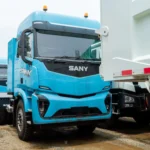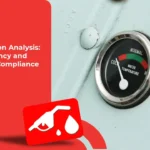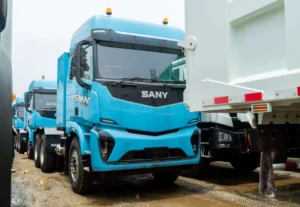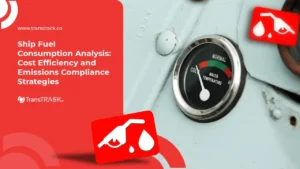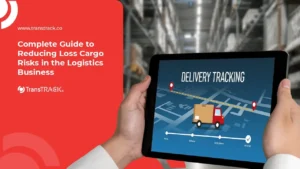Indonesia’s Potential in Electric Vehicle Industry Supported by TransTRACK Technology
Posted on September 26, 2024 by Nur Wachda Mihmidati

The development of electric vehicle (EVs) globally marks a fundamental change in Indonesia’s transportation policy. With abundant nickel reserves, Indonesia is strategically positioned to become a key player in the EV supply chain. Nickel, which is a critical component in battery manufacturing, gives Indonesia an edge with reserves of 21 million metric tons out of a total of 94 million metric tons in the world. These resources, coupled with strategic investments in technology, talent, renewable energy and infrastructure, can propel Indonesia to become a major player in the EV industry. The government estimates that it will require investments of up to US$35 billion in the next 5 to 10 years to develop the EV ecosystem and secure Indonesia’s vital position in this global supply chain.

Early Growth of Electric Vehicle Market in Indonesia
In 2019, electric vehicle (EV) sales in Indonesia were recorded at 705 units, with 685 units being hybrid sales and 20 units being Plug-in Hybrid Electric Vehicles (PHEV). The number of electric car sales in Indonesia increased to 1,900 units in June 2022. Of the total, 1,378 models were hybrid (72.5%), 34 PHEV models (1.8%), and 488 Battery Electric Vehicle (BEV) models (25.7%). Although interest in EVs only accounted for 0.5% of total car sales in Indonesia in the first half of 2022, this significant increase shows that the EV market is still at an early stage, but interest in it has been increasing rapidly. Given the growing urbanization and high proportion of teenagers in the population, interest in EVs is expected to continue to grow as Indonesians move towards a more sustainable lifestyle.
Nonetheless, Indonesia still faces major challenges in building its electric vehicle ecosystem. As of November 2022, there were only 219 EV charging stations operating in 185 locations across Indonesia, while during the same period, there were around 5,500 authorized conventional fuel stations in the archipelago. However, ignoring the potential of the EV sector in Indonesia would be a mistake, given the promising market of the world’s fourth most populous country. Toyota Indonesia has announced plans to build an electric car battery assembly plant at their facility in Karawang, West Java, starting next year. This move is in line with Toyota’s plan to start producing hybrid electric vehicles (HEVs) in the same period, suggesting that EV development in Indonesia has bright prospects ahead.
Indonesia’s Potential in Electric Vehicle Ecosystem
Indonesia has the world’s largest nickel reserves, around 21 million tons, which is a key ingredient in the manufacture of lithium-ion batteries. Lithium-ion packs alone account for about 40-70% of the total battery cost, so Indonesia has great potential in the global supply chain for EVs. With this mineral wealth, the Indonesian government has initiated investments to strengthen its role in the materials industry that supports battery production. In addition, Indonesia also has the potential to develop a battery recycling industry as battery usage increases, which will add economic value and further lower the cost of BEVs in the future. As such, Indonesia is strategically positioned to capitalize on the BEV ecosystem and contribute to lower EV costs globally.
In addition, the development of electric vehicle (EV) supply chain infrastructure in Indonesia is underway. This development includes several important stages involving various industry sectors and the government.
- Mining: The initial stage is the mining of the raw materials required for battery manufacturing. Indonesia has significant reserves of minerals such as nickel to fulfill this need. The Ministry of Energy and Mineral Resources (MEMR), Antam, and Inalum along with private local players are involved in this sector.
- Raw Material Processing: Once the raw materials are obtained, processing into precursors for battery materials is performed. This process ensures that the raw materials can be used in the manufacture of battery components.
- Cell Component Production : At this stage, specialized battery components such as cathodes, anodes, and electrolytes are produced. The Ministry of Industry, Indonesia Battery Corporation, as well as private partnerships such as LG and CATL play a role in ensuring the smooth running of this process.
- Battery Cell/Pack Production: Battery cell production involves cell fabrication and integration of various components such as electronics, sensors, and battery management systems. At this stage, the battery is ready for use in an EV.
- EV Production : This stage involves the manufacturing of electric vehicles as well as the integration of batteries and other subsystems. Players in the EV industry and the Indonesian EV association work together to develop and produce electric vehicles.
- Charging Infrastructure: Charging infrastructure is a key element to support the widespread adoption of EVs. The construction of charging stations and battery exchanges is carried out by companies such as Pertamina, PLN, and private partnerships.
With the involvement of the government and various industry sectors, Indonesia is strengthening its position in the global EV supply chain, utilizing its natural resource reserves and building the necessary infrastructure to support a sustainable electric vehicle ecosystem.
Challenges and Opportunities in Electric Vehicle Adoption in Indonesia
According to research from AC Ventures and AEML, public awareness of electric vehicles (EVs) in Indonesia has increased, but there are still significant concerns regarding quality, design, and infrastructure. Based on the survey, 63% of respondents are aware that electric motorcycles are available for purchase in Indonesia, while 37% are unaware of this. In terms of features, fuel efficiency received the most positive response with 95% of respondents giving favorable responses. In addition, 84% of respondents also welcomed the lower maintenance costs. However, there were major concerns regarding mileage, with 68% of respondents giving a negative assessment. The design and model of electric motorcycles is also an issue, with 84% of respondents being dissatisfied. Meanwhile, the price of electric motorcycles showed a more balanced response, with 63% of respondents considering it affordable. Charging infrastructure is the biggest challenge, with 81% of respondents giving it a negative rating, followed by the dimensions and size of the motorcycle, which is only favored by 21% of respondents. Thus, while interest in electric vehicles is growing, there are still challenges to overcome regarding design, price, and especially infrastructure to support wider adoption.

With the increasing adoption of electric vehicles in Indonesia, technologies that support efficiency and sustainability are increasingly important. TransTRACK comes with technology solutions that support the vision of green technology. Our fleet monitoring system not only facilitates efficient management of electric vehicles but also contributes to green efforts through several advanced features:
- Energy Monitoring: Monitors the energy usage and battery efficiency of electric vehicles in real-time, assisting in more efficient charging planning.
- Emissions Reporting: Provides data on emission reductions and environmental impacts of the fleet, supporting companies in achieving their sustainability targets.
- Charging Infrastructure Integration: Allows integration with charging stations, easing management and optimization of the electric vehicle charging process.
- Performance Management: Analyze vehicle performance to ensure optimal operation and reduce carbon footprint.
TransTRACK eases the transition to green technology by leveraging innovation to support the efficiency and sustainability of your electric vehicle fleet. Contact us to find out how our technology can support your journey towards a greener future.
Topic :
Recommended Articles

 Bahasa Indonesia
Bahasa Indonesia



